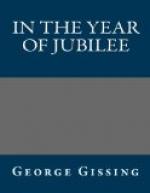‘I fear him as little as I fear you.’
’Well, as I’ve told you, you needn’t fear me at all. I like you better for this—a good deal better than I used to. If you want any help, you know where to turn; I’ll do whatever I can for you; and I’m in the way of being useful to my friends. You’re cut up just now; it’s natural. I won’t bother you any longer. But just remember what I’ve said. If I can be of any service, don’t be above making use of me.’
Nancy heard without heeding; for an anguish of shame and misery once more fell upon her, and seemed to lay waste her soul.
Part V: Compassed Round
CHAPTER 1
There needed not Mary Woodruff’s suggestion to remind Nancy that no further away than Champion Hill were people of whom, in extremity, she might inquire concerning her husband. At present, even could she have entertained the thought, it seemed doubtful whether the Vawdrey household knew more of Tarrant’s position and purposes than she herself; for, only a month ago, Jessica Morgan had called upon the girls and had ventured a question about their cousin, whereupon they answered that he was in America, but that he had not written for a long time. To Mrs. Baker, Jessica did not like to speak on the subject, but probably that lady could have answered only as the children did.
Once, indeed, a few days after her return, Nancy took the familiar walk along Champion Hill, and glanced, in passing, at Mr. Vawdrey’s house; afterwards, she shunned that region. The memories it revived were infinitely painful. She saw herself an immature and foolish girl, behaving in a way which, for all its affectation of reserve and dignity, no doubt offered to such a man as Lionel Tarrant a hint that here, if he chose, he might make a facile conquest. Had he not acted upon the hint? It wrung her heart with shame to remember how, in those days, she followed the lure of a crude imagination. A year ago? Oh, a lifetime!
Unwilling, now, to justify herself with the plea of love; doubtful, in very truth, whether her passion merited that name; she looked back in the stern spirit of a woman judging another’s frailty. What treatment could she have anticipated at the hands of her lover save that she had received? He married her—it was much; he forsook her —it was natural. The truth of which she had caught troublous glimpses in the heyday of her folly now stood revealed as pitiless condemnation. Tarrant never respected her, never thought of her as a woman whom he could seriously woo and wed. She had a certain power over his emotions, and not the sensual alone; but his love would not endure the test of absence. From the other side of the Atlantic he saw her as he had seen her at first, and shrank from returning to the bondage which in a weak moment he had accepted.
One night about this time she said to herself:




